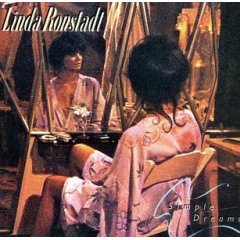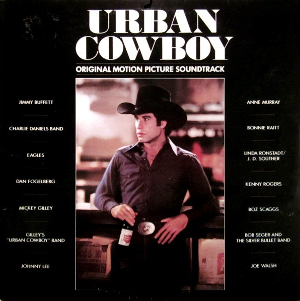
The Eagles are an American rock band formed in Los Angeles in 1971. With five number-one singles and six number-one albums, six Grammy Awards and five American Music Awards, the Eagles were one of the most successful musical acts of the 1970s in North America and are one of the world's best-selling bands, having sold more than 200 million records worldwide, including 100 million sold in the US alone. They were inducted into the Rock and Roll Hall of Fame in 1998 and were ranked number 75 on Rolling Stone's 2004 list of the "100 Greatest Artists of All Time". Founding members Glenn Frey, Don Henley, Bernie Leadon, and Randy Meisner were recruited by Linda Ronstadt as band members, some touring with her, and all playing on her third solo studio album, before venturing out on their own on David Geffen's new Asylum Records label.
Soft rock is a form of pop rock that originated in the late 1960s in Southern California and the United Kingdom which smoothed over the edges of singer-songwriter and pop rock, relying on simple, melodic songs with big, lush productions. Soft rock was prevalent on the radio throughout the 1970s and eventually metamorphosed into a form of the synthesized music of adult contemporary in the 1980s.

Donald Jay Fagen is an American musician who was the co-founder, lead singer, co-songwriter, and keyboardist of the band Steely Dan, formed in the early 1970s with musical partner Walter Becker. In addition to his work with Steely Dan, Fagen has released four solo albums, beginning with The Nightfly in 1982, which was nominated for seven Grammys.
"Poor Poor Pitiful Me" is a rock song written and first recorded by American musician Warren Zevon in 1976.

William Royce "Boz" Scaggs is an American singer, songwriter, and guitarist. He was a bandmate of Steve Miller in The Ardells in the early 1960s and the Steve Miller Band from 1967 to 1968.

John David Souther is an American singer, songwriter, and actor. He has written and co-written songs recorded by Linda Ronstadt and Eagles. Souther is known for his songwriting abilities, especially in the field of country rock. He co-wrote some of the biggest hits for Eagles, including "Best of My Love", "Victim of Love", "Heartache Tonight", and "New Kid in Town". "How Long", which appears on Eagles' Long Road Out of Eden, was written by Souther and originally recorded on his first solo album in 1972. Souther recorded two major hit songs in his solo career: "You're Only Lonely" (1979) and "Her Town Too" (1981), a duet with his longtime friend James Taylor.

Daniel Grayling Fogelberg was an American singer, songwriter, and multi-instrumentalist. He is primarily known for his 1980s soft rock hits, including "Longer" (1980), "Same Old Lang Syne" (1981), and "Leader of the Band" (1982).

Timothy Bruce Schmit is an American musician, singer, and songwriter. He has performed as the bassist and vocalist for Poco and the Eagles, having replaced Randy Meisner in both cases. Schmit has also worked for decades as a session musician and solo artist. In 1998, he was inducted into the Rock and Roll Hall of Fame as a member of the Eagles.

"Blue Bayou" is a song written by Roy Orbison and Joe Melson. It was originally sung and recorded by Orbison, who had an international hit with his version in 1963. It later became Linda Ronstadt's signature song, with which she scored a Top 5 hit with her cover in 1977. Many others have since recorded the song.

Michael H. McDonald is an American singer, keyboardist and songwriter known for his distinctive, soulful voice and as a member of Steely Dan (1973–1974), and the Doobie Brothers. McDonald wrote and sang several hit singles with the Doobie Brothers, including "What a Fool Believes", "Minute by Minute", and "Takin' It to the Streets." McDonald has also performed as a prominent backing vocalist on numerous recordings by artists including Steely Dan, Toto, Christopher Cross, and Kenny Loggins.

Silk Degrees is the seventh solo album by Boz Scaggs, released on Columbia Records in February 1976. The album peaked at No. 2 and spent 115 weeks on the Billboard 200. It has been certified five times platinum by the RIAA and remains Scaggs's best selling album.

Down Two Then Left is the eighth album by singer Boz Scaggs, released in 1977. It peaked at No. 11 on the Billboard 200. This album is notable for featuring the first studio work done by Steve Lukather.

John McFee is an American singer, songwriter, guitarist, record producer, and multi-instrumentalist, and long-time member of The Doobie Brothers.

Other Roads is the tenth studio album by Boz Scaggs released in 1988. After an eight-year hiatus from recording, Scaggs returned in 1988 with this album, a record aimed primarily at the adult contemporary market.

Simple Dreams is the eighth studio album by the American singer Linda Ronstadt, released in 1977 by Asylum Records. It includes several of her best-known songs, including her cover of the Rolling Stones song "Tumbling Dice" and her version of the Roy Orbison song "Blue Bayou", which earned her a Grammy nomination for Record of the Year. The album also contains covers of the Buddy Holly song "It's So Easy!" and the Warren Zevon songs "Poor Poor Pitiful Me" and "Carmelita". The album was the best-selling studio album of her career, and at the time was the second best-selling album by a female artist. It was her first album since Don't Cry Now without long-time musical collaborator Andrew Gold, though it features several of the other Laurel Canyon-based session musicians who appeared on her prior albums, including guitarists Dan Dugmore and Waddy Wachtel, bassist Kenny Edwards, and producer and multi-instrumentalist Peter Asher.

"We're All Alone" is a song written by Boz Scaggs, which became a hit for Frankie Valli in 1976. The next year it was a top-ten hit for Rita Coolidge in the US and the UK. Scaggs introduced it on his 1976 album Silk Degrees, and included it as the B-side of two of the four single releases from that LP, including "Lido Shuffle".
Richard Thomas Marotta is an American drummer and percussionist. He has appeared on recordings by leading artists such as Aretha Franklin, Carly Simon, Steely Dan, James Taylor, Paul Simon, John Lennon, Hall & Oates, Stevie Nicks, Wynonna, Roy Orbison, Todd Rundgren, Roberta Flack, Peter Frampton, Quincy Jones, Jackson Browne, Al Kooper, Waylon Jennings, Randy Newman, Kenny G, The Jacksons, Crosby, Stills & Nash, Boz Scaggs, Warren Zevon, and Linda Ronstadt. He is also a composer who created music for the popular television shows Everybody Loves Raymond and Yes, Dear.

"Lido Shuffle" is a song written by Boz Scaggs and David Paich and introduced on the 1976 Boz Scaggs album Silk Degrees. It was subsequently released as a single in 1977 and was produced by Joe Wissert.

"It Keeps You Runnin'" is a song by the American rock band The Doobie Brothers. The song was written by band member Michael McDonald, and served as the third single from their sixth studio album Takin' It to the Streets (1976). It was also covered by Carly Simon the same year and released as the lead single from her sixth studio album Another Passenger.

Urban Cowboy: Original Motion Picture Soundtrack is the soundtrack to the 1980 film Urban Cowboy. It spawned numerous Top 10 Billboard Country Singles, such as #1 "Lookin' for Love" by Johnny Lee, #1 "Stand by Me" by Mickey Gilley, #3 "Look What You've Done to Me" by Boz Scaggs, #1 "Could I Have This Dance" by Anne Murray, and #4 "Love the World Away" by Kenny Rogers. It also included songs that were hits from earlier years such as #1 "The Devil Went Down to Georgia" by the Charlie Daniels Band and "Lyin' Eyes" by the Eagles. The film is said to have started the 1980s boom in pop-country music known as the "Urban Cowboy Movement" also known as Neo-Country or Hill Boogie. In December 2018 the soundtrack was certified triple platinum by the RIAA for sales of three million copies.
















